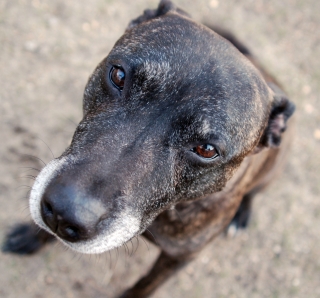Obey Thy Dog

Dogs growl. It is part of being a dog. Dogs growl to protect stuff, dogs growl to say "hey, that is enough of that" to other dogs, and dogs growl when they are having a good time sometimes.
Dogs growl for a reason. Aggression is a very expensive behavior in the big scheme of things. It takes a lot of energy and risk to react aggressively. A growl is a down-payment on an investment in aggressive behavior.
If something happens that causes your dog to growl - STOP. Do not push your dog any further. Say "Thank you!!" and retreat. Go sit at the kitchen table with a pad of paper and a pencil. Write down what time of day this happened, where it happened, what the dog was doing, what YOU were doing, and what was involved(dog bed, particular type of bone/chew, toy). Your dog was being polite when he told you, "Hey, I am not so sure about this. You better back off."
When a dog growls at us we have to respect that. We have somehow pushed him past his comfort point and we have to retrace our steps to find out where we went too far or wrong. By retreating from a growling dog we did, technically, reinforce him growling at us. That much is true and, in my book, totally okay. I will accept just a growl any day. By pushing him further, not backing away, we chance an even bigger display and possible injury due to his Plan A not working. Dogs don't miss when it comes to landing bites.
At this point we have a dog over threshold. He is in a downward spiral of fear and therefore will be unable to learn anything from the experience other than growling DID NOT work. Next time, by the law of animals, he will quite possibly take it a step further in an attempt to get his point across. Even worse, if he growled and you slapped him on the muzzle, he possibly learned that growling is not safe to use as a signal. It is in these cases, when the warning signals are punished out aversively, that you have a dog who is "unpredictable". You build a dog who turns into a time bomb, showing no loud and clear signals to his perceived threat to back off. You just get a dog who lunges and bites when things have gone way, way too far. This is not good.
Back to the growling dog whom we wisely retreated from. What now? We do not want to continue rehearsing this behavior with him. Fear generalizes terribly well and it is possible that the one situation that he feels unsure in can bleed into other aspects of his life. We have to deal with him in a calm, strategic way to help him realize we aren't the enemy. We want him to realize we can approach him while he has a marrow bone and have things work out in his favor. We can help him feel good about being tethered and approached by people - in fact, it is the best thing to ever happen to him. It equals chicken or beef or something equally great.
Do not take his growling personally. A dog does NOT growl to insult you ('you' being collective). A dog is not undermining you when he growls as if to say "neener neener neener". Your dog is giving you a GIFT by growling. We must not mistake growling for a "dominance" play. The fact is that aggression is a fear based behavior; your dog isn't attempting to run your life when he growls. He is afraid. He is afraid you are going to take whatever he's got, cause him some physical discomfort, or otherwise do something that he generally does not feel good about. Whether that is really the case or not does not matter - your dog is reacting.
Stop confronting your dog - today. Empathize with him and understand both sides of the picture in front of you when growling happens. Do not punish your dog for speaking up on his own behalf.
Seek help. A dog behavior professional such as a behaviorist or a trainer can help provide a levelheaded look into your dog's behavior and reactions to certain situations and stimuli. Do this immediately if your dog has bitten anyone and has a bite history - it could save his life.
Do not let this fester, even if your dog has never actually bitten anyone. This will not go away on its own. Do not let your dog live another day feeling fear unnecessarily. You can help him learn that former scary things are now great, fun things for him. Do it for him and do it for yourself.




